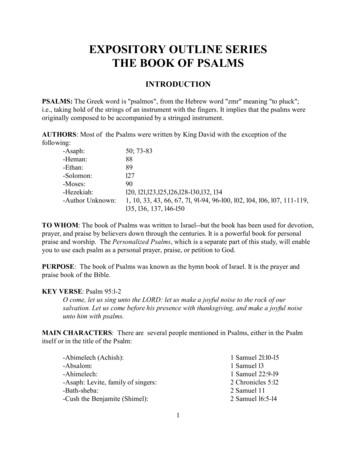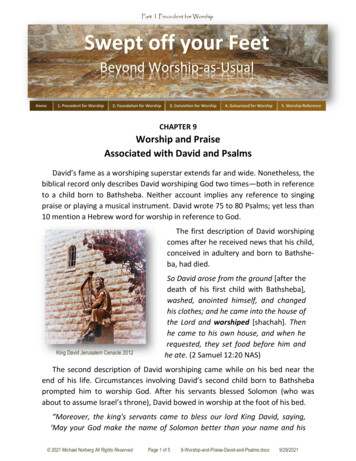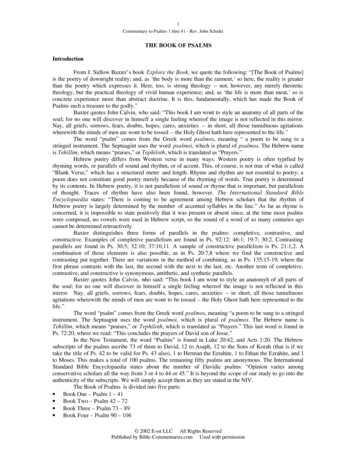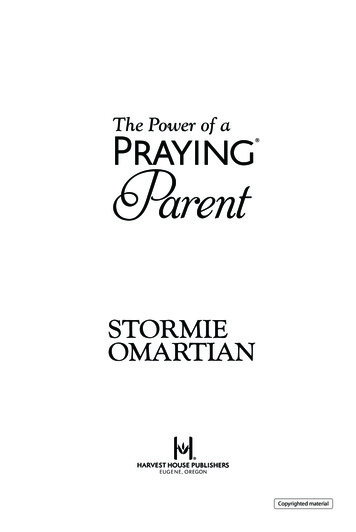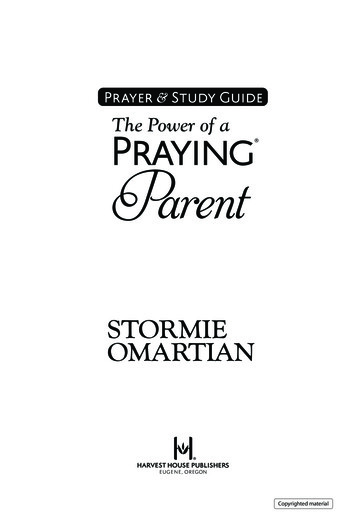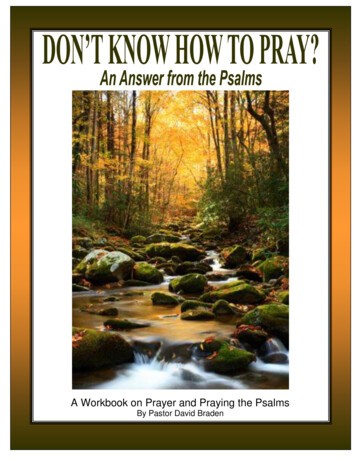
Transcription
A Workbook on Prayer and Praying the PsalmsBy Pastor David Braden1
Copyright 2010 by David S. Braden. This data file is the sole property of David S. Braden. It may becopied only in its entirety for circulation freely without charge. All copies of this data file must contain thiscopyright notice. This data file may not be copied in part, edited, revised, copied for resale or incorporatedin any commercial publications, recordings, broadcasts, performances, displays or other products offeredfor sale, without the written permission of David S. Braden.Requests for permission should be made in writing and addressed to Pastor David S. Braden7pastordavid7@gmail.comUnless otherwise noted, Scripture taken from the New King James Version, Copyright 1982 by ThomasNelson, Inc. Used by permission. All rights reserved.Cover image used with permission of istockphoto.com2
Table of ContentsIntroductionpage 4Lesson #1:I.II.III.IV.V.Growing in God’s Word.Why should we pray?Why pray the Psalms?Homework for the next classA cautionpage 5Lesson #2:I.II.III.IV.IV.Review homework assignmentThemes in the book of Psalms“How to” pray the PsalmsPreparing to prayHomework for the next classpage 11Lesson #3:I.II.III.IV.V.Review homework assignmentDifficulties with praying the psalmsPersonalizing the psalmsExamples of paraphrase prayingHomework for final sessionpage 15Lesson #4:I.review previous lesson andhomework assignmentthe promise of the programstaying with the programhomework“by the numbers”page 20II.III.IV.V.3
Introduction“Turn to the Lord’s prayer in the sermon on the mount” is the answer most often givenwhen asked the question on the cover of this workbook. And it is a good answer andperhaps the best answer for new Christians.Many God-fearing Christians all over the face of the earth have committed this prayer tomemory and use it on many occasions.However, there is another answer.Why not turn to the book of Psalms, Israel’s songbook, Israel’s prayer book, and use thePsalms that were prayed by many God-fearing, God-loving persons? The peoplepraying these Psalms prayed in every situation in life and in such a way that the HolySpirit deemed their prayers worthy of recording for future generations.Well, that’s fine for you to say, but which one should I pray, and how do I do it? Manyare national prayers, congregational prayers, prayers in the third person plural, etc.How can I make these prayers my own?That is the purpose of this study course and booklet to provide some introductoryinstruction to people who want to pray the Psalms. It also provides answers to otherquestions such as “Why should I pray the Psalms?” or “Who else is doing this?”Praying the Psalms is not a new or novel idea. Dedicated Christians have, forcenturies, prayed the Psalms. One author I was reading recently wondered whyChristians today aren’t praying the Psalms. I believe many do. They just don’ talkabout it.I’ve have prayed the Psalms for some time now and find it to be an enriching, rewardingexperience. Sometimes, when I’m having a bad day (or just don’t know what’s going onexcept that my countenance is downcast), I spend 30-40 minutes praying some of thePsalms I’ve memorized, and often, after the time of prayer, the cloud has lifted.Praying the Psalms renews our minds and does a warfare. It is a putting off of the old,natural patterns of thinking and putting on the new, the ways, plans and purposes ofGod.I am convinced that praying the Psalms will enrich the devotional life of anyone with thediscipline to embrace it.I also know that since the Psalms are the Word of God that they are powerful, effectiveand alive to work in us the purposes of God, to make us more like Christ.This course was first taught as a 4 session course at Church. This workbook wasdeveloped as a guideline for each of the four sessions.Additionally, T.M. Moore’s book “God’s Prayer Program, Passionately Using the Psalmsin Prayer” was used as a supplemental reading assignment for the course. There are anumber of references to his book in this document.4
Lesson #1Lesson #1 Outline: I.II.III.IV.V.I.Growing in God’s Word.Why should we pray?Why pray the Psalms?Homework for the next classA cautionGrowing in God’s Word:There are many ways we can be involved with God’s Word. Each of these ways can beuseful to us.1.2.3.4.5.6.7.8.9.10.11.12.Reading scripturesUnderstanding what you’re reading (see Neh. 8: 2, 3, 8)Meditating on a passage (Ps 1)Memorization “Thy Word have I hid in my heart.” (Ps. 119:11)Studying the Word in depthHearing the Word preachedListening to scripture songsObeying what God’s Word saysSharing God’s truth with othersQuoting God’s Word in times of trial or spiritual warfare (see Matt. 4)Praying God’s Word (e.g. praying the Psalms)Can you identify another way to be involved in God’s Word.(add at # 12 above)The fact that there are so many ways to experience God’s Word in our lives givesus a strong clue as to the importance of God’s Word in our lives.II.Why should we pray?I encourage you to look up the scriptures as you read through this listing.1.Prayer is the natural expression of our new life in God’s family.2.Prayer is our life line to the Father; in it, we communicate and fellowshipwith our Heavenly Father.3.This is the example given us by Jesus’ life. (see p. 30)4.It is a command. (Matt. 7:7 – ask, seek, knock)5.Through prayer, we bring down the blessings of heaven on ourselves andothers. (Ja. 5:16 – prayers of a righteous man )6.Prayer is transformational; through it, by the Holy Spirit, we are changedand transformed. (Ps. 51 – David’s petition to “create in me a cleanheart.”)5
7.Prayer maintains the devil’s defeat. It is part of our spiritualarmor/weaponry. It is vital to defeating our enemy. (see Eph. 6:10-20 –praying always with all prayer and supplication in the Spirit )8.Prayer strengthens our faith. Ps. 40:1-3 Note what God did in responseto David’s cry for help.9.Prayer is the way to know great and hidden things. (see Jer. 33:3)10.Prayer pleases God. (He sees us doing something He has commandedus to do.) Ps. 27:8 “When you said: Seek my face ”Also: Ps 50:15 “Call on me in the day of trouble ”11.Prayer is the surest way to know peace. (see Phil. 4:6-7)12.Prayer is our means of help in times of trouble. (Ps. 28:1, Ps 40:1-2)From these 12 reasons alone, we should easily be able to agree with T.M. Moore whenhe says: “Mastering the discipline of prayer is something to which every Christian mustdevote himself.” (pp. 48-49)Do these potentials and promises encourage you to become more effective in prayer?And these are just some of the reasons to cultivate an effective prayer life. (Ourworkbook provides 17 reasons for prayer.)See if you can add several more reasons. Be sure to provide a scripture quote or anexplanation for your responses below.1.2.3.III.Why pray the Psalms?1.Praying the Psalms teaches us to pray with wisdom, boldness and in ways wewould probably never think to pray.Examples:2.The Psalms remind us of who God is and, in doing so, provide us words withwhich to pray and worship Him.Examples:6Ps 119:33-40 - Look for 8 important ways every Christian shouldpray.Ps 90: 12, 16-17 – “teach us to number our days”Ps 2:2 - the kings and rulers of the earthPs 145: 3, 5, 6b, 7-8, 17) – “His greatness is unsearchable.”Ps 8, 19 (creation Psalms)Ps 90: 1-2 (Eternal, everlasting)
3.The Psalms provide one of the most complete pictures of who God is.-4.8, 19, 100 He is the Creator of the universe.93 He is the ruler of all He has made.50, 96 He is the judge of all men.95, 105 He is the redeemer of His people.50, 111 He is all wise, powerful and glorious in all He is and does.23 He is our shepherd who leads, feeds, guides, heals and protects.40 He is the one who rescues us from the difficulties of life.We see pictures of Jesus suffering (22), His vicarious atonement (69), Hisresurrection (16) and His eternal reign (2) Messianic themes appear inmany of the Psalms (40)145 His greatness is unsearchable (has no limits).The Psalms encourage us to think great thoughts about God.e.g. Ps 40He thinks about us.G. Ervincalc 7 Xs/sec (that God thinks about us)Scientific fact: The human brain is capable of processing 1015actions/sec (and He created it.)As we meditate and pray on these Psalms, we build within ourselves a morecomplete picture of the God we serve. We are continually reminded of featuresof God that we wouldn’t ordinarily think upon. This alone will increase our faithand trust in God.5.The Psalms remind of what God has done and will do.Examples:Ps 84:11b “No good thing does He withhold from those who walkuprightly.”Ps 145: 9, 14-16 “You open Your hand and satisfy the desire ofevery living thing.”Ps 46 (A Mighty Fortress – Luther) – refuge and strength6.The Psalms present us with a wide range of individual situations and needs. Inthese situations, we learn the prayers of godly saints and how we too can praywhen we find ourselves in similar situations. As we pray these Psalms, theybecome our words, our prayers.Ps 40Ps 51Ps 73in a horrible pitDavid – repentingcomplaint about the prosperity of the wickedWho hasn’t, at some time in their life, prayed Psalm 23 or 51?Our prayers become informed and guided by the words and thoughts that areprovided in the scriptures.7
7.The Psalms are a part of the sword of the Spirit and praying the Psalms is one ofthe ways we can effectively employ this spiritual weapon.Examples- “waking up with a cloud, a downcast spirit” (see introduction)- feeling my mind hassled8.Praying the Psalms engages the power and effectiveness of the Word of God,our spiritual sword, that cleanses and renews our minds.Illustration: The first time I began a program of memory work, I experienced awork of cleansing and a renewed excitement about God’s Word. I was soexcited about it that I became instrumental in persuading others that they tooshould embrace a memory program.9.We know that the Psalms are God’s Word and praying them pleases Him.I believe that God enjoys hearing His children saying His words back to Him.10.In praying the Psalms, we get a glimpse into the heart and life of men andwomen of God. This will be challenge to us to live holy lives.Example:11.Ps 35:11-14 David’s prayer for his enemiesNeh. 1:Nehemiah heard the news of the demise ofJerusalem. Then he prayed and fasted for 4 months.(even though he had never been there nor knownanyone who was living in Jerusalem at the time)The Psalms provide us many examples of people who had a problem. As theybegin to pray, we hear the groanings of their hearts for freedom and deliverance.As they continue to pray, they come through the difficulty and come to a place ofpeace and praise, of worship. As such, they are a help and a guide for us whenwe are trying to persevere in a trial.Examples:Ps 22 the suffering of the cross, to praisePs 43 rejection, self-rebuke, praise, hopePs 13 hopelessness, confidence, praiseToo often, we stop short of a completed prayer. Our prayers are usually endedwhen we complete our petition or complaint. The Psalms show us a pattern ofcompleted prayer.We see the instantaneous results of a Psalm of prayer.Important note: Praying the Psalms is not always the answer to a problem ordifficulty you may be facing. Other actions such as repentance, confession,forgiveness, restitution, etc. may be the appropriate action following a prayer toresolve a conflict or difficulty.12.8Praying the Psalms remind us:
Of who we are Ps 100to be thankful Ps 100to have an attitude of praise Ps 100of His blessings and promises Ps 91:3-15 (as a result of vv. 1-2: dwells andtrusts)- of His mercy in choosing us (see Romans 9)-13.Praying the Psalms reminds us of God’s wisdom.Examples:Ps 1 - the Godly vs the ungodlyPs 40 - the person God uses:a. v.4 “makes the Lord his trust”b. v.8 “delight to do your will”c. v.8b “law is within my heart”Ps 84 – the person God uses - “makes it a spring”Ps 91 – the person God uses - “set his love on me (God)”Note the blessings that accrue from this action.14.Praying the Psalms is a deterrent to sin. (Ps. 119:11 “Thy Word have I hid in myheart that I might not sin against God.”15.When you pray the Psalms , you begin to understand the wisdom and beauty ofeach Psalm. They become familiar friends that are available to you at all timesand in all circumstances.-sitting in the Dr.’s office waiting for the doctor – rehearsing Ps 148-150sitting at a traffic light w aiting for the complete intersection light rotationbecause you barely missed the green light.Can you think of additional reasons as to why praying the Psalms is desirable?1.2.3.IV.Homework for the next class1.2.V.Read chapters 1 and 2 of T.M.Moore’s book on Prayer.Memorize either of the following “verbatim” Psalms:Psalm 8, orPsalm 150, orDo the Psalm 90 Verbatim Praying exercise that begins on page 83.A cautionTaking up the discipline of praying the Psalms will not be an easy task. No truediscipline ever is. It will require determination and perseverance on your part.9
Nothing worthwhile ever comes without a price.If you’re looking for an easy way to become effective in prayer, there is none.Especially in prayer, there is a warfare to be fought. Our enemy does not wantus to be effective in prayer. He does not want to see a church and its peopleeffective in prayer.Prayer is hard work and learning to pray the Psalms will be one of the mostdifficult adventures in which you will ever engage.Don’t be discouraged. Saints throughout the ages have found this discipline tobe a source of great power, blessing and encouragement and a help to intimatefellowship with God.10
Lesson #2Growing in God’s Word.Why should we pray?Why pray the Psalms?Last week:Lesson #2 Outline: I.II.III.IV.I.Themes in the book of Psalms“How to” pray the PsalmsPreparing to prayHomework for the next classThemes in the book of PsalmsPsalms is a book of music without notes and prayers without restraint. (Original tunesare no longer in existence.)It contains some of the highest notes of praise while also containing some of the lowestnotes of struggling hearts that will break if their deliverer doesn’t answer soon.The Psalms start where we are and teach us how to find refuge in the Lord, regardlessof our emotional state, so that we may rest and rejoice in Him.Themes in Psalms: Following are some of the themes found in the Psalms.-II.thanksgiving and adoration (100)individual and community praiseindividual and national lament (137)royal – focusing on the kingship of Godsongs of Zionpenitential/confession (32, 38, 51)imprecatory – not cries for personal vengeance but to God tovindicate His name and preserve the office and mission ofHis plan of salvation against those who have tried to usurpthe cause of God and Christ in the worldMessianic (22)wisdom (1, 119)testimony (40)admonition/warning (50)songs of ascent – to be sung when going to Jerusalem (120-134)Hallel – high praise 146-150“How to” Pray the PsalmsA.Verbatim Praying (8, 19, 23, 38, 44, 51, 56, 57, 67, 80, 84, 90, 92, 145)Praying the words that are in the text, just as they are.In some Psalms, you may want to change the action from indicative(statement of a fact) to direct address.Example: Ps 23 “The Lord is my shepherd.”to: Lord, You are my shepherd.11
B.Paraphrase Praying (9, 18, 26, 36, 59, 62, 84)Paraphrase praying is useful when the circumstances of the prayer don’tfit with ours but suggest something similar.e.g. Ps 59:1-4 (p. 89) We may not have enemies lurking behind a tree butwe do have spiritual enemies that will try to trip us up.Ps 84:9C.“Behold our shield; look upon the face of Your anointed.”This is a reference to the king of Israel. Our prayer might befor our president or people in positions of authority.Praying over a Psalm (78, 104, 105, 106, 147)Summarize large sections. Useful in praying longer Psalms.Summarize the content of the Psalm or of each stanza/segment.107: Ways people go astray: lost their way, rebelled, iniquities,busy in business.Especially useful for Psalms that rehearse the history of Israel. Ps 78D.Responsive (1, 37,46, 73, 87, 91, 99, 114)Respond to issues raised in the Psalm or in each segment.Allow the Psalm to guide your prayers.e.g. Ps 1 guard: my steps/path; my friendships; the desires of my heartE.Guided (2, 47, 67, 72, 73, 80, 129, 130, 133, 134)Let the Psalm guide you to pray for something particularly pressing in yourlife or for someone else:e.g.Ps 67 might guide you to pray for missionsPs 129 : persecution – persecuted churchPs 90:16 “ let your work appear to your servants and your gloryto their children”We could pray that God will reveal Himself and His glory to theyouth of CCW.F.Combination (18 (see Moore: p. 100), 19, 40)Some Psalms can be combinations of any of the 5 methods above.e.g. 19 vv. 1-11 guided : praise – creation and the Wordvv. 12-14 verbatimIn class: Review the following Psalms and determine how to pray: 1, 8, 18, 59, 78,106*12
III.Preparing to PrayThe following outline is suggested as a guide to be used in preparing to pray apsalm.1.Select a psalm.2.Read through it several times until you have a sense or understanding ofthe psalm.3.Note the following:A.Type of Psalm (general category)B.ThemeC.Key verse/sD.SegmentsE.Key wordsF.Determine “how to pray”G.Identify any memory work you want to do.An excellent way to pray a “Verbatim” Psalm is to commit it tomemory.This stores the Psalm in your heart so that it is readily accessible toyou no matter where you are. (Doctor’s office, waiting at a stoplight, standing in line at Walmart, etc.)It also serves to eliminate distractions and the wandering mind.Recalling a Psalm from your mind requires a higher level ofconcentration than reading it from a page and therefore forces youto focus more intently on it.A recommended memory process:1.Begin by selecting a short Psalm (e.g. 8, a Psalm ofascent from 120-134, 121 is an excellent starting choice “I liftup my eyes to the hills ”)2.Do one verse a day.3.Read the verse out loud 10 times.4.Close the book and say it out loud 10 times.By now, you will most likely have it committed to memory.This process might take 5 minutes.13
5.On day two, take the next verse and follow the guidelinesof step 4.6.Then add the verse from the previous day and repeat themin sequence 5 times.7.Continue this process a verse per day until the entire Psalmis stored in your heart.IV.Homework for the next class1.Select a Psalm and walk through the steps of Section III.2.Read chapter 3 of the work book.14
Lesson #3Lesson #1:Growing in God’s Word.Why should we pray?Why pray the Psalms?Lesson #2: I.Themes in the book of Psalms“How to” pray the Psalms- verbatim- paraphrase- praying over a psalm- responsive- guided- combinationPreparing to prayLesson #3 Outline:I.I.II.III.IV.Difficulties with praying the psalmsPersonalizing the psalmsExamples of paraphrase prayingHomework for final sessionDifficulties with praying the psalms1.Not all of the Psalms are written as prayers to God. Some Psalms wereoriginally written as devotional thoughts about God (23); a few Psalmspour out anger at enemies (3, 4); some Psalms are instructional (119) teaching the Law of God.Ps 1 is a wisdom psalm that contrasts the righteous and the ungodly.Ps 2 is a Messianic psalm in which the ungodly are shown to war againstGod’s rule. God’s Son is established as the ruler over all nations and theearth’s rulers are warned to serve the Lord with fear.2.Not all psalms are directly addressed to our present circumstances; e.gpsalms of Zion, songs of ascent. (were sung by Israelites when making apilgrimage to Jerusalem for an annual feast).Why not try reciting Psalms while you’re on vacation when you’re on theroad.3.Not all psalms are written in language that is easy to grasp; e.g. 91: “Hewho dwells in the secret place of the most High shall abide under theshadow of the Almighty.” (What/where is the secret place? How do youfind it?)4.Some are filled with historical references or narratives; e.g. 785.Some don’t fit our needs; e.g. 137615
7.So how do we personalize the psalms so that they fit our current need andrhetorical style? How do we bring them to our present-day situation?How do we work with a psalm so that it becomes “our words?”III.Personalizing the Psalms1.Change nouns, pronouns, verb tenses and moods.e.g. change from statement of fact (indicative) to direct addresse.g. 23: “The Lord is my shepherd.” To: Lord, You are my shepherd.“I shall not want.”To: I won’t lack anything that I need.e.g. 76 “In Judah, God is known.”To: Lord, your people know Youwell.“His name is great in Israel.” To: We exalt your great name, OLord.e.g. 149:2 “Let Israel rejoice in their maker.”To: “We rejoice in You, our Maker.”2.Change OT reference to NT realities.IsraelOffer sacrificesEgyptPromised landIsrael’s kingsto: the church (see Rom. 2:28-29: the trueJew)to: offer sacrifices of praiseto: our own deliverance from the bondage ofsinto: the land of promisesto: our rulers and public officials3.Change the enemies of the psalmist -to: our spiritual enemies4.A psalm does not describe our personal situation.e.g. 88 – Many of us are not in this depth of despair. But, we may knowsomeone who is. Pray for them.5.Praying what God desires or warns us about.e.g. Ps 48 – describes the church as “the joy of the whole earth.” This iscertainly not true in our world today. But, this is what God desires. So wecan pray that God would send a Spirit of revival to His church and putin her the godly characteristics that would make her the joy of the wholeearth.6.16Sing the Psalms/Compose a melody for a psalm
7.Praying the Messianic psalms (see P. 115 Moore for further discussion ofthis topic.)A.B.C.8.Keep in mind our union with ChristRecall the work of Christ (see Ps 22)Meditate on His glory.Problem Psalms:119 - length45 – references to “the king’s daughter”49 – the foolishness of the unbelief of the peoples of the world58 – unrighteous “gods”IV.Examples of paraphrase prayingIn many psalms, the wording or circumstances do not entirely fit our own. The followingexamples provide exercises in paraphrasing a psalm so that they closely align with ourcircumstances or use wording which is more appropriate for our way of speaking andmore meaningful to us. (A modern paraphrase translation can be helpful in thisexercise.)1.Psalm 23(rich in symbolism – see “A Shepherd Looks at Ps 23” by Phillip Keller“The Lord is my shepherd.I shall not want.He makes me to lie down in green pastures.He leads me beside the still waters.He restores my soul.He leads me in paths of righteousnessfor His Name’s sake.Yea though I walk through the valley of the shadow of deathI will fear no evilFor You are with meYour rod and your staff, they comfort meYou prepare a table before meIn the presence of my enemies.You anoint my head with oilMy cup runs over.Surely goodness (tov)and mercy shall follow meall the days of my lifeAnd I will dwell in the house of the Lord forever2.Psalm 1Blessed is the manWho walks not in the counsel of the ungodly,Nor stands in the path of sinners,Nor sits in the seat of the scornful.17
But his delight is in the Law of the LordAnd on His Law he meditates day and night.He shall be like a treePlanted by the rivers of waterThat brings forth its fruit in its season.Whose leaf also shall not wither.And whatever he does shall prosper.The ungodly are not so,But are like the chaff which the wind drives away.Therefore, the ungodly shall not stand in the judgmentNor sinners in the congregation of the righteousFor the Lord knows the way of the righteousBut the way of the wicked shall perish.V.Homework for the next class1.Read Chapter 4 in “Moore”2.Select a psalm and paraphrase it so that it will be your words, yoursituation.or: Compose a melody for a Psalm or a portion of a Psalm.Word Study from Ps 23:6“good” from Hebrew word “tov” to be good, beneficial, be well, be pleasing, befavorable, to be lovely, to be cheerful, to be happy, to be comfortable, to be right, tomake good, to do well, do good, to adorn, to cheer up, to please. It ranges frompractical economic or material good to abstract good. It may refer to moral goodness orwhat is good philosophically. It can also refer to good quality.Does this enlarge the meaning of the phrase “yom tov?” (good day)For Meditation:Also the word “follow” in this verse means to pursue, to chase after.What are the implications of chasing after rather than following?What does this say about the heart of God?Why would the God of the universe be chasing after you (or me)?What will God do when he “catches us?”Do you “comprehend”/”know” that God is pursuing you?18
Could this knowledge give you hope when you’re in a desperate situation?Consider this translation: It is a guarantee that every day of your life God is chasingafter you with His “tov” and “chesed” (covenant faithfulness).19
Lesson #4Lesson #4 Outline:I.II.III.IV.the promise of the programstaying with the programhomework“by the numbers”Review:“How to” pray the Psalms-VerbatimParaphrasePraying over a psalm (lengthy psalms)ResponsiveGuidedCombination- homework assignment Lesson #3- Select a psalm and paraphrase it so that it will be your words,your situation; or- Compose a melody for a Psalm or a portion of a Psalm.- Difficulties with praying the psalms- “How to” personalize the psalmsI.The Promise of the Program:What will your prayer life be like in 3 years?How do you envision it?What do you want it to be?201.a greater sense of the presence of God2.greater consistency in prayer3.more comprehensiveness in prayer (cover more subject matter)4.greater sense of freedom5.enrichment of all of your prayers6.see an increase in the quickening power of the Holy Spirit as Hebrings Psalms to your remembrance in times of ministry.7.greater effectiveness and power in prayer8.a greater focus on heavenly realities
9.II.an enlarged picture in our hearts of the greatness of God (p. 137)10.an enlarged vision of the person and work of Jesus11.improved relationship with the Lord- the sense of God’s presence throughout the day- greater insight into the glory of God in every day experience- strength for spiritual warfare- knowing greater joy and peace- more abundant lifeStaying with the Program:How will you be able to stay on the program in the midst of the many obstaclesyou will face?A.What might the obstacles be?1.Praying the Psalms is something new to us, something with whichwe are not familiar. It will require changes, adaptations,adjustments in your usual “modus operandi”, it will take you “out ofthe comfortable.”It may be slow at first and frustrating.2.Praying the Psalms will require more time and concentration in yourprayer life. It will be work (but work well-worth the reward.)3.You may feel that praying the psalms limits you from getting to theissues that are important to you.4.Be assured (if you aren’t already) that the devil doesn’t want you togrow in your prayer life. He will work with numerous distractions tohinder your progress. (the phone will ring, a child will cry, Fedexwill deliver a package, a thought will trigger a mental path that takesyou away from praying, an emergency will come up the needs to bedealt with right now, etc.)5.And the excuses see chapter 1 of our workbook“Most things worthwhile in our lives come with a price tag.”B.What can I do to overcome these obstacles?1.Design a program of praying the psalms that you are willing toembrace.Go slowly, very slowly at first. Don’t commit to the world.21
I recommend that you start by memorizing a single Psalm. (Seep.12, paragraph III.3.G for a memorization process) Use thisas a pilot project to give you a feel for the amount of work involvedin a single psalm. Then you’ll be more prepared to design a longerrange program.Experiment. (Most experiments don’t go perfectly the first time.)2.Don’t allow guilt over a missed assignment to derail you.Any time we submit to a regular schedule, we run the risk ofimposing a kind of legalism on ourselves (complete with selfcondemnation) that can be oppressive.“You will not be able to keep any schedule perfectly.”“The moving finger writes ” (O. Khayam)Guide the moving finger that is now writing.(You can’t change what it wrote yesterday.)Simply move on. Pick up where you left off.Take advantage of the current opportunity you have.Don’t allow the devil to get you in a “dither” (relic word from thepast; or, if you prefer “a tornado of confusion”) over the previousday’s missed opportunity.3.Learn to deal with distractions.Most of them can be ignored.If a distraction is particularly troublesome, take a moment to prayover it and ask God for help to resolve it or release it.Call a distraction a distraction. Recognize it for what it is. This issimilar to our spiritual warfare one of the first steps in overcomingis to vocally state that your issue is an attack from the devil. (bringit out into the open, out of the hidden recesses of your mind.)III.Resist the devil. (James 4:7)5.Find an accountability partner.6.Pray the Psalms with someone; at a Bible study, a church meeting,at home with your family, etc.7.Recognize that prayer is hard work.The holy men of old recognized it as “the labor of God.”Homework1.224.Finish the book
2.IV.Design and begin your own personal “praying the psalms” programBy the numbers (For your information and curiosity)Average psalm length (excluding 119) 15 verses(with Ps 119 16 verses/psalm)Average length of time to read an average psalm at normal speed about 1minutePsalms with 40 or more verses 8Psalms with 30 – 39 verses 5Psalms with 20-29 verses 26Psalms with 19 or less verses 111 74% of the psalmsPsalms with 6 or less verses 19Psalm with the least verses 117 2 versesTotal # of verses in the book of Psalms 2440Amount of time needed to read straight through the book of Psalms 2440/15 162.67 minutes say about 3 hours to read through the book ofPsalms at an average rate of reading.** This is using my normal ra
The Psalms are a part of the sword of the Spirit and praying the Psalms is one of the ways we can effectively employ this spiritual weapon. Examples - “waking up with a cloud, a downcast spirit” (see introduction) - feeling my mind hassled 8. Praying the Psalms


